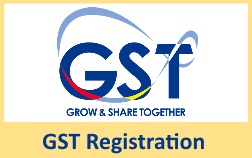Throughout: The Ultimate Roadmap to GST Registration for Organizations Seeking Financial Security
Navigating the complexities of Goods and Provider Tax (GST) enrollment is a vital step for companies striving for monetary security. Damaging down the roadmap right into manageable actions can simplify the enrollment journey for businesses looking to enhance their financial standing.
Understanding GST Fundamentals
Exploring the fundamental principles of Goods and Solutions Tax (GST) is important for acquiring an extensive understanding of its ramifications on services and the economic situation. GST is a value-added tax obligation levied on a lot of items and services for residential usage. It has actually changed numerous indirect tax obligations that existed in the pre-GST era, improving the tax structure and improving convenience of doing service in India. Under the GST system, both products and solutions are tired at a details rate, which is determined based on their category. If their annual turnover surpasses the threshold restriction established by the federal government, businesses are called for to sign up for GST. Input Tax Credit Score (ITC) is a significant feature of GST, enabling services to assert credit score for taxes paid on inputs, reducing the general tax obligation burden. Comprehending the fundamentals of GST is essential for companies to follow tax guidelines, handle their financial resources efficiently, and contribute to the country's economic growth by taking part in a transparent tax obligation system.
Eligibility Requirements for Enrollment
To sign up for GST, organizations have to satisfy details eligibility standards established by the government. The primary qualification demand is that any kind of service entailed in the supply of goods or solutions with an annual accumulation turnover over the threshold limitation set by the authorities need to sign up for GST. Since the present laws, the threshold limit for GST registration is a yearly aggregate turnover of 40 lakhs for companies operating within a state, with the exception of special category states where the restriction is 20 lakhs. Additionally, certain businesses are required to register for GST regardless of their turnover, such as interstate providers, informal taxable individuals, and businesses reliant pay tax under the reverse cost device. It is essential for organizations to extensively evaluate their turn over and transaction types to identify their GST enrollment commitments accurately. Failure to register for GST when eligible can lead to penalties and legal repercussions, making it vital for services to abide by the defined eligibility requirements.
Records Needed for Registration
Having actually fulfilled the eligibility standards for GST registration, businesses must currently guarantee they have the requisite papers in position to continue with the registration process successfully. The documents needed for GST enrollment commonly consist of proof of company constitution, such as collaboration deed, registration certification, or consolidation certificate for various kinds of businesses. In addition, companies require to offer records developing the major workplace, such as a rental agreement or electrical power costs. Frying pan card of the organization, as well as the identification and address evidence of promoters/partners/directors, are important for verification objectives. Bank account declarations, in addition to canceled cheques or a copy of the bank passbook, are needed to confirm the monetary details supplied during enrollment. Businesses have to have digital signatures prepared for the licensed notary. Ensuring all these files are organized and readily offered will expedite the GST registration procedure, making it possible for services to abide with tax obligation guidelines perfectly.
Step-by-Step Registration Process
Commencing the GST registration process entails a collection of structured steps to make sure a smooth and certified registration for businesses. The first action is to see the GST website and fill up out the enrollment kind with exact information of business entity. Following this, the candidate site gets a Momentary Recommendation Number (TRN) which is made use of to return to the this link application procedure if it's not finished in one go.
Next, all needed files according to the checklist supplied by the GST portal need to be submitted. These files generally consist of proof of service address, identification and enrollment evidence of marketers, monetary declarations, and company entity's frying pan card.

Post-Registration Conformity Guidelines

Conclusion
To conclude, companies looking for financial security should understand the basics of GST, meet eligibility requirements, gather needed papers, comply with the step-by-step registration process, and abide by post-registration standards - Best GST registration services in Singapore. By sticking to these steps, businesses can ensure compliance with tax policies and maintain financial stability in the future
Furthermore, certain services are called for to register for GST regardless of their turnover, such as interstate providers, casual taxable persons, visit site and businesses responsible to pay tax obligation under the reverse cost device.Having fulfilled the qualification criteria for GST enrollment, businesses should now guarantee they have the requisite documents in place to continue with the enrollment process efficiently. The files needed for GST registration typically include proof of business constitution, such as collaboration action, registration certification, or incorporation certificate for various kinds of services. Furthermore, organizations require to offer documents developing the major place of company, such as a rental contract or power costs.Starting the GST enrollment process entails a collection of organized steps to make sure a certified and seamless registration for companies.